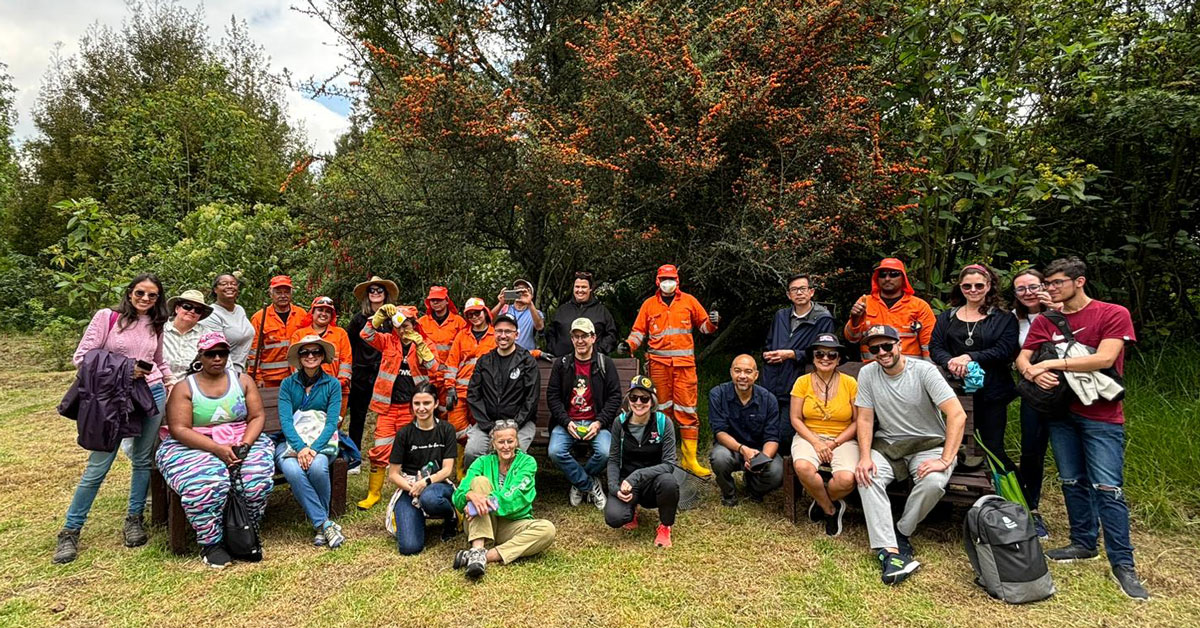‘If Earth’s biodiversity was a country,
it would be called Colombia.’*
Blog #1 – Bogota
By Dr. Bobby Gondola, Jr.
with Lyndsy Tainsh and Susanne Wissell
BLOG #1 — BOGOTA
The Journey Begins
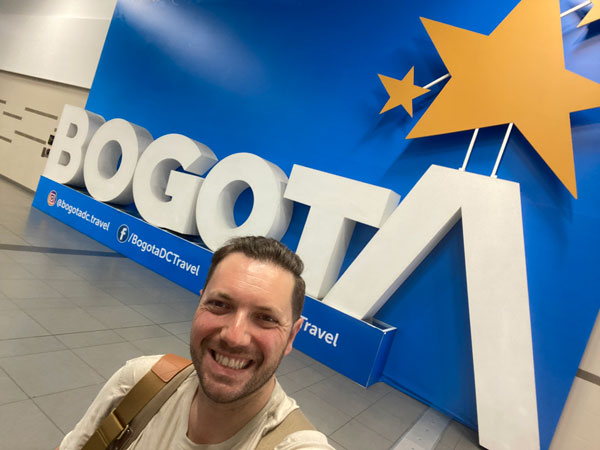
Dr. Bobby Gondola Jr., Adjunct Professor in Johnson & Wales University’s (JWU) MBA — Nonprofit Management program, was excited this June to find himself preparing to participate — for a second time in his career — in the prestigious Department of Education’s Fulbright-Hays program.
Fortunate to be chosen even once for a Fulbright scholarship, Dr. Gondola — or “Dr. Bobby” as he is known to his students — will travel to Latin America to complete his second Fulbright Commission-sponsored research. As the only participant from New England for the trip, he will join 12 scholars from institutions around the United States to visit the capital city of Bogota and the major cities of Letitia (Amazonas), Cali, Medellin and Barranquilla.
This summer’s month-long immersive experience focuses on higher education in Colombia — a country renowned for its incredibly rich biodiversity and environmental climate. The theme of the seminar is environmental sustainability and energy, in part because Colombia generates 70% of its electricity by hydroelectric means (IEA, 2021).
Eager to share his travel experiences, in what he describes as the ‘magical country of Colombia,’ with JWU students and colleagues, Dr. Bobby plans to send weekly journal entries for posting to our JWU Online Career Catalyst Blogs.
Climate Change, Biodiversity and Sustainability
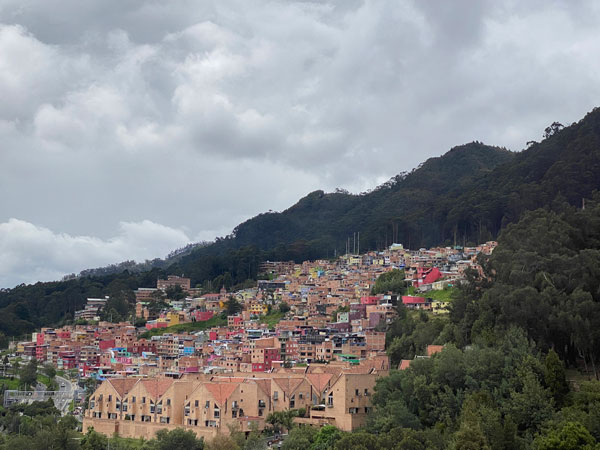
At the center of a downtown, stately, stone campus building in Bogota, the capital city of Colombia, this year’s Fulbright scholars from around the United States gathered with natural scientists, a geographer, an oceanographer, biologists, and a marine biologist, from Colombia’s Universidad del Rosario. Our purpose was a co-creation session on teaching and research agendas for sustainability. Its focus, driven by the host scholars, was climate change and biodiversity, modeling, and experiments in Colombia.
Colombia recognizes the great importance for sustainability, and our partnership is to promote intercultural exchange of ideas and research. One of the country’s leading biologists and professor at Colombia’s Universidad del Rosario, presented on the rich plant, insect, and wildlife of this beautiful country. Colombia is situated in one of the most diverse ecological ecosystems in the world — this includes the Andes Mountains, the Caribbean Sea, the Pacific Ocean and the Amazon Rainforest. It was a breathtaking immersion into an introductory understanding of such a rich place.
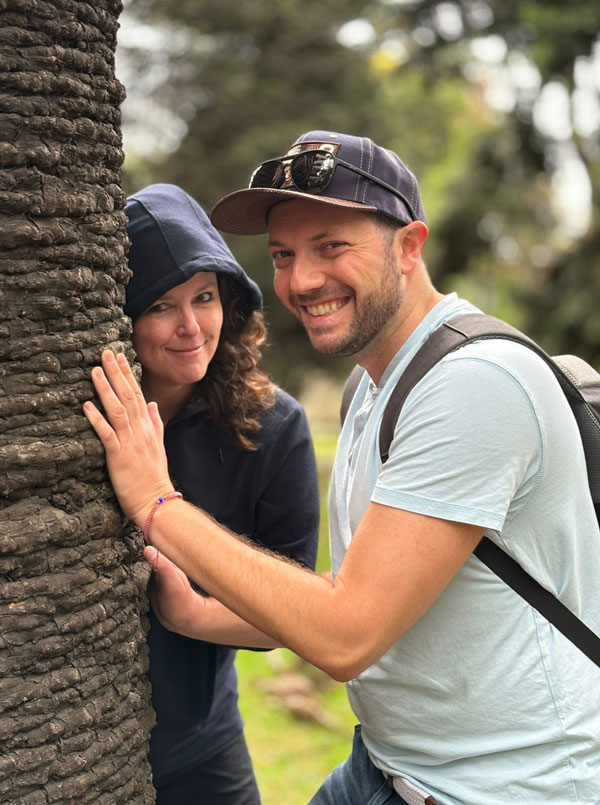
Natalia Vargas Estupinan, PhD, Adjunct Professor at Universidad del Rosario, referenced a once-printed National Geographic headline* that read, “If earth’s biodiversity was a country, it would be called Colombia.”
Biodiversity is defined as the extraordinary variety of life on earth, including the genre of species, ecosystems, and the value they perform. More than inhabit 26,000 plant species inhabit Colombia, including the world’s greatest number of palms (2nd) and orchids (1st). There are upwards of 8,000 vertebrates, including the most hummingbirds (1st), amphibians (2nd), fish (2nd), reptiles (3rd), and cats (6th) in the world. Finally, there are 18,000 or 19,000 invertebrates that inhabit Colombia including more ‘mariposas’ — the Spanish name for “butterflies” — than anywhere else in the world, according to Dr. Vargas. To date, I have spotted mariposas in white, gray, brown, blue, orange, yellow, and red.
Collaboration
The Blue Economy
One of Colombia’s leading marine biologists and professor at Universidad de Rosario, Dr. Andrea Devis-Morales, presented on the ‘Blue Economy’ in Colombia with striking parallels to the growing work in Rhode Island. The Blue Economy is a term that describes sustainable ways to develop economic growth and the production of food, energy and other resources that are associated with the oceans and seas. Dr. Devis-Morales described the focus of the research that included jobs growth, smart shipping, sustainable fishing, and harnessing renewable energy — and how each would protect coastal communities and respond to increasing climate changes (IPCC, 2019).
The Bogota Botanical Garden
To underscore the rich diversity of Colombia’s biodiversity, we visited the Bogotá Botanical Gardens, where we observed exhibits displaying plants according to the various ecosystems, influenced by climate and altitude, that the plants inhabit across the country — all in the enormous park space in the heart of the city.
Meeting With Professors and Researchers
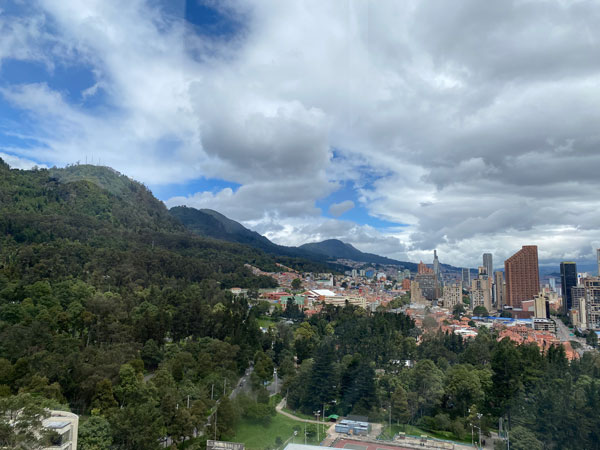
I was so impressed to see the passion that each researcher had for their students, and I was inspired by each one’s commitment to a better world, through improved environmental and climate efforts. I did not want to choose.
Later in the week, atop the mountains surrounding Bogota, to the North, we met professors and researchers at the Pontificia Universidad Javeriana, where in an almost speed-dating like format, I met professors and researchers who each shared their research methodologies and research expertise. The administrators of the University asked that we ‘find a dance partner’ with whom we would like to collaborate.
Therefore, I felt honored when Dr. Aída Sofía Rivera Sotelo, anthropologist and ethnographer, approached me to ask if I would work with her. She even shared her research connections that she has with Rhode Island, and her knowledge of the Blue Economy work being done back at home.
El Salitre – The Wetlands
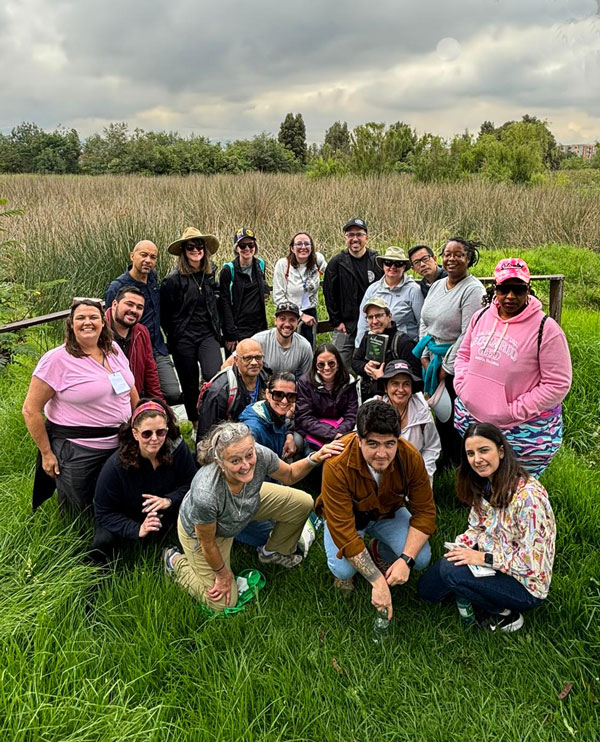
The following day, I joined the Fulbright group with many of the members of the Javeriana team for a visit to El Salitre, the wetlands to the west of the city, lands that were home to rich diversity of plants and animals with striking juxtaposition to the occasional loud jets above us, that took off from the nearby international airport; it was a stark reminder of dichotomy between airplanes that bring us there and plants that bring us air.
As I sat in the last row of the bus en route to the wetlands, I saw Dr. Sofia board, and we sat side-by-side as we shared our work and planned to visit with her research and team in Barranquilla in a few weeks, when we are by the sea.
Backcasting To The Desired Future State
The day ended with a ‘backcasting’ activity, in which we began with the problem and then worked backwards to determine how to achieve solutions. This was led by Dr. Lucas R. Ivorra Peñafort, of Design Factory Colombia. I have previously used a similar method to the backcasting method that Amazon and other organizations have used.
Executives at Amazon would begin meetings in silence, while everyone read a document or memo that a colleague had prepared for that meeting. Participants would come into alignment about ‘what desired future state do we want?’ and then would decide together ‘what is the current state that are we in?’ The latter part of the meeting would be dedicated to ‘how’ they would get to the desired future state from the current state. This is analogous to imagining the desired course learning outcomes we have for students at JWU. and then building a syllabus that accomplishes these goals.
On To The Amazon
Speaking of ‘Amazon,’ I am about to leave Bogota to head to the real Amazon – the biome, which is predominantly covered by tropical rainforest. Touring Bogota has been breathtaking — and SO magical.
I’m so excited and thankful for the opportunity to share my journey through this blog, as I reflect on this amazing Fulbright experience. I’m hopeful that what I learn from travels in South America can be applied right at home in Rhode Island and provide valuable information for the students JWU. In my next blog. I will detail my visit to the city of Leticia in the state of Amazonas.
About Dr. Bobby Gondola, Jr.
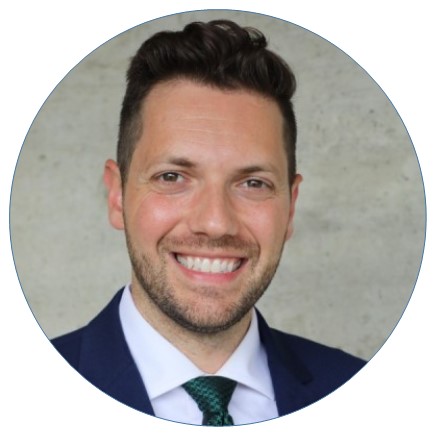
Dr. Bobby Gondola Jr., Adjunct Professor in Johnson & Wales University’s (JWU) Master of Business Administration – Nonprofit Management degree program, is completing his second Fulbright Commission-sponsored research trip to Latin America during June-July 2024. As the only participant from New England, he joins 12 scholars from other higher education institutions throughout the United States for a month-long trip to Colombia.
Accompanied by faculty members at various universities in Colombia, Dr. Bobby and his colleagues will delve into the country’s incredibly rich biodiversity and environmental climate. The theme of the trip centers on environmental sustainability and energy, in large part due to over 70% of the electricity of Colombia being generated by hydroelectric means.
Dr. Bobby previously completed a Fulbright-Hays fellowship in Mexico, researching the Afro-Mexican experience, intercultural education, and culturally responsive student engagement. Dr. Gondola’s research expertise in workforce development and skills/professional development centers students in decision-making as well as policy. With administrator experience in higher education and as a past school board leader in Providence, one of the country’s 50 largest school districts, Dr. Bobby helps administrators engage with students through powerful storytelling and participant-generated visual methods.
When he described his motivation for participation, Dr. Bobby shared, “With the growing population of Hispanic and/or Latinx students attending college in Rhode Island and across the United States, administrators must be ever responsive to the needs of potential students, current students, and their families.” He continued that, “This experience will widen my knowledge of research in higher education, the Blue Economy, and understanding the skills and careers that sustainability will create, plus I will be able to deepen my Spanish-speaking.”
Dr. Bobby has taught courses at JWU in nonprofit management, social entrepreneurship, decision-making and analysis and personnel in nonprofits, as well as program evaluation in adult education programs at the University of Rhode Island.
“We congratulate Bobby for his remarkable achievement – a second Fulbright award,” said Lyndsy Tainsh, Director of Academic Programs for Business. “His selection recognizes his commitment to student success and his intentions supporting students from diverse backgrounds and experiences.”
Dr. Bobby understands that students are often working and managing family responsibilities while continuing their education. He brings his own experiences as a first-generation college graduate and seasoned leader of the nonprofit, corporate and government sectors.
Dr. Bobby is currently working with designers on updating NPM5010, Introduction to Nonprofit Management. “I anticipate including a case study for a unit on sustainability — environmental-related — but hope to also encourage extensions for students to imagine sustainability in nonprofit organizations,” stated Dr. Bobby. “For example, ongoing funding, continuity in leadership, and program growth plus a new or additional environmental case example, will be updated in the class. I also anticipate using a Hispanic-serving organization as a separate case example, given the increasing enrollment of Hispanic and/or Latinx students, and as another opportunity to provide racially and ethnically diverse examples in coursework.”
Lyndsy Tainsh concluded, “We acknowledge that Dr. Bobby’s participation in a Fulbright seminar will prepare him to return prepared to continue positively contributing to the JWU learning community and the careers of the students he teaches.”
